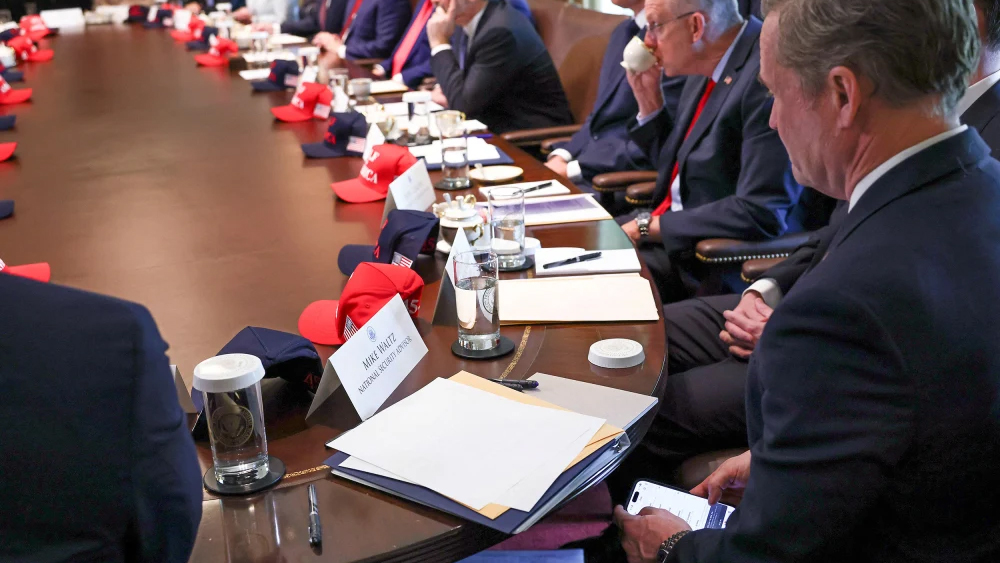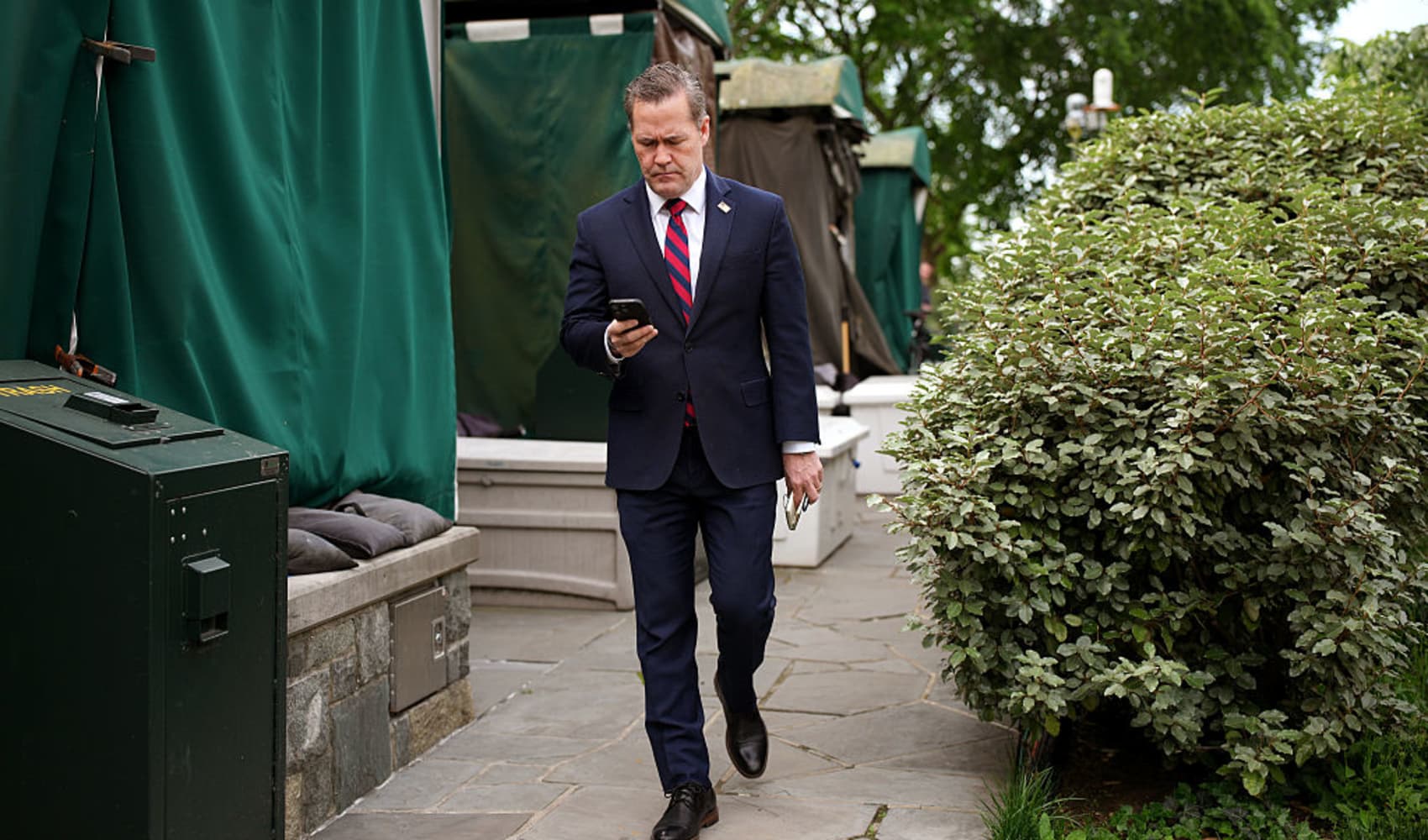Mike Waltz's App: Is it Signal or a Security Risk?
Mike Waltz's Messaging App Mystery: Is It Signal or TeleMessage?
Introduction: Decoding the Digital Chatter
In the world of politics, where every move is scrutinized and every image analyzed, even a glimpse of a smartphone screen can spark a firestorm. Remember the whole "Signalgate" saga? Well, buckle up, because it seems we're diving into similar territory with former national security adviser Mike Waltz. A recent photo has surfaced, showing what appears to be Waltz using a messaging app that bears a striking resemblance to Signal. But is it really Signal, or is there more than meets the eye? Let's unpack this digital puzzle.
The Incriminating Photo: A Picture is Worth a Thousand Secrets
A picture, published by Reuters, is at the heart of this whole story. It captures Waltz’s smartphone displaying message threads with names like "JD Vance" and "Gabbard." The app’s interface immediately reminded many of Signal, the encrypted messenger app famous for its privacy features. But here’s the twist: it might not be Signal at all.
TeleMessage Enters the Chat: A Signal-Like App with a Twist
The app in question appears to be TeleMessage, a platform that, according to reports, leverages some of Signal’s encryption technology. What sets it apart? It seems to cater to clients who need to archive messages for compliance reasons. Think regulated industries where keeping records of communication is a must. It begs the question, why is Waltz using such an app?
The TM SGNL PIN: A Unique Identifier
Adding another layer of intrigue, the app displays a prompt for the user to “verify your TM SGNL PIN.” This specific phrasing is a key piece of evidence pointing towards TeleMessage. An investigation by NBC News couldn't find any other app that uses that terminology. It appears to be a unique hallmark of TeleMessage.
Waltz's Past Messaging Mishaps: Déjà Vu?
This incident isn’t happening in a vacuum. It comes just over a month after Waltz faced criticism for accidentally including a journalist in a group chat discussing military plans. Talk about awkward! This prior incident certainly adds fuel to the fire and raises questions about Waltz’s digital communication practices.
Signal vs. TeleMessage: What's the Real Difference?
Signal: The Privacy Champion
Signal is renowned for its end-to-end encryption, meaning only the sender and receiver can read the messages. It's a favorite among privacy advocates and those seeking secure communication. Think of it as the digital equivalent of whispering in a crowded room.
TeleMessage: Encryption with Compliance
TeleMessage, on the other hand, seems to offer a similar level of encryption but with the added capability of archiving messages. This archiving feature is crucial for industries that need to comply with regulations such as Sarbanes-Oxley or HIPAA. It’s like having a secure conversation that’s also being recorded for posterity.
Why the Fuss? The Implications of Archiving Messages
The archiving feature is what's causing the stir. Signal's appeal lies in its ephemerality – messages can be set to disappear after a certain time. TeleMessage's archiving capability raises questions about transparency and potential access to sensitive information. Are these conversations truly private if they're being recorded?
JD Vance and Gabbard: Who's in the Chat?
The appearance of names like "JD Vance" and "Gabbard" in Waltz's message threads naturally raises questions. Who are they communicating with, and what are they discussing? These are high-profile figures, and any communication with them could be of public interest. What kind of work is Waltz doing with them?
Compliance Concerns: Is Waltz Required to Archive Messages?
Is Mike Waltz subject to any regulations that require him to archive his communications? If so, using TeleMessage would make sense. However, if he's not required to archive messages, the choice to use such an app becomes more perplexing.
The Optics Problem: Perception vs. Reality
Regardless of the technical differences between Signal and TeleMessage, the optics aren't great. The appearance of using a Signal-like app, especially after the previous messaging mishap, creates a perception of secrecy and a desire to control information. In politics, perception is often reality.
The Government and Messaging Apps: A Growing Trend?
This incident highlights a growing trend of government officials using encrypted messaging apps. While encryption is essential for secure communication, it also raises concerns about transparency and accountability. How do we balance the need for security with the public's right to know?
The "Signalgate" Precedent: A Reminder of Past Controversies
The "Signalgate" controversy, where White House staffers were allegedly using Signal to communicate, serves as a reminder of the potential for these apps to be used to circumvent transparency requirements. This latest incident adds another layer to the ongoing debate about the use of encrypted messaging apps in government.
The Search for Transparency: Demanding Accountability
Ultimately, the questions surrounding Waltz's use of TeleMessage come down to transparency and accountability. The public has a right to know what their elected officials are communicating about and who they are communicating with. Demanding accountability is crucial for maintaining trust in government.
The Future of Political Communication: Navigating the Digital Landscape
As technology continues to evolve, politicians and government officials must navigate the complex digital landscape. Balancing the need for secure communication with the public's right to know is a challenge that requires careful consideration and ethical decision-making. It's a tightrope walk between privacy and transparency.
Conclusion: Unanswered Questions and Lingering Doubts
The photo of Mike Waltz using what appears to be TeleMessage has opened a can of worms. While the app may offer legitimate benefits, especially for those needing to archive communications for compliance, it raises questions about transparency and the potential for circumventing accountability. Whether it's Signal, TeleMessage, or another encrypted app, the underlying issue remains the same: How do we ensure transparency in an age of increasingly secure communication? The answers remain elusive, leaving us with more questions than answers.
Frequently Asked Questions (FAQ)
- What exactly is TeleMessage and how does it differ from Signal?
TeleMessage is a messaging app that uses encryption similar to Signal but includes archiving capabilities, designed for businesses that need to record communications for compliance. Signal prioritizes privacy and doesn't offer built-in archiving.
- Why is the "TM SGNL PIN" significant in this situation?
The "TM SGNL PIN" prompt is a unique identifier that strongly suggests the app in the photo is TeleMessage, as no other known messaging apps use this specific terminology.
- What regulations might require someone like Mike Waltz to archive messages?
Depending on his specific role and responsibilities, Waltz might be subject to regulations like the Federal Records Act or other compliance requirements that mandate the preservation of certain communications.
- Does using an encrypted messaging app automatically imply wrongdoing?
Not necessarily. Encrypted messaging apps are valuable for secure communication, but using them can raise transparency concerns, especially for public officials, if it appears they are trying to avoid public scrutiny or accountability.
- What are the potential consequences if a public official uses messaging apps to circumvent transparency laws?
If a public official is found to be using messaging apps to intentionally avoid transparency laws, they could face legal consequences, including fines or even criminal charges, depending on the specific laws and the nature of the information being concealed.

